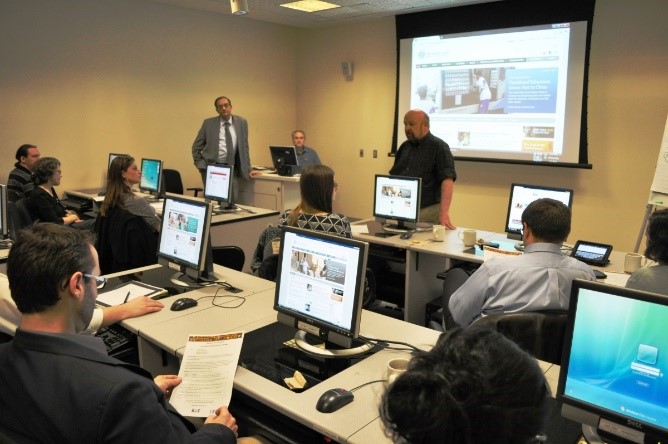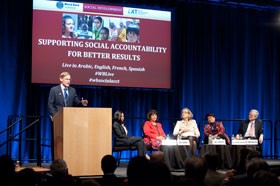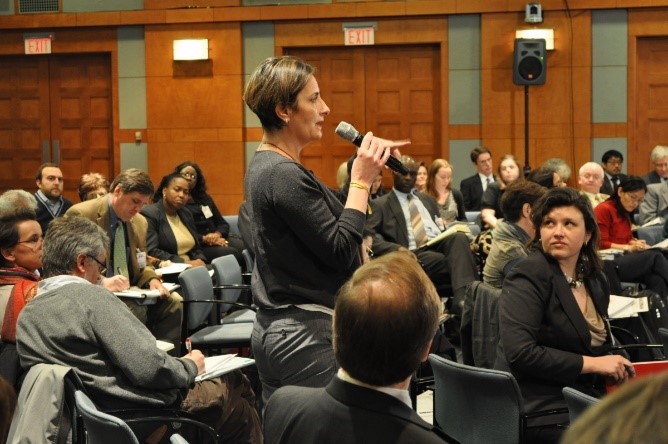Les débuts d’un fonds pour la responsabilité sociale novateur

Photo: Ryan Rayburn
À l’issue d’un processus de consultation à grande échelle et de plus d’une année de planification, le Partenariat global pour la responsabilité sociale (GPSA) est désormais opérationnel et a annoncé son premier appel à propositions le 11 février 2013. Avec sa politique de transparence, sa structure de gouvernance inclusive et la priorité thématique stratégique donnée à la responsabilité sociale, le GPSA marque incontestablement un jalon dans les relations entre la Banque et la société civile. Après 30 ans de collaboration avec la société civile via le dialogue sur les politiques publiques, la consultation et le financement, la création du GPSA envoie un signal clair indiquant que la Banque a l’intention d’institutionnaliser et de renforcer son appui aux organisations de la société civile (OSC).
L’idée du GPSA est née à la suite d’un discours prononcé par Robert B. Zoellick, l’ancien Président de la Banque, au Peterson Institute en avril 2011, au lendemain du Printemps arabe. Dans ce discours, M. Zoellick a évoqué la nécessité d’un nouveau contrat social entre les citoyens et l’État. Il a annoncé que la Banque allait étudier avec ses actionnaires les moyens d’appuyer les OSC œuvrant en faveur de la responsabilité sociale. Ce discours a été suivi par un vaste processus de consultation multipartite sur la conception et la portée du fonds proposé. De janvier à mars 2012, plus de 870 parties prenantes de 57 pays ont pris part à 25 réunions en face à face et vidéoconférences organisées dans le monde entier. De plus, près de 300 personnes ont soumis des commentaires écrits directement sur le site Web du GPSA. Plusieurs recommandations énoncées par les OSC ont ainsi pu être prises en compte dans la conception du GPSA, dont la nécessité de concourir au financement de base et au financement à long terme des OSC, et de veiller à ce que les OSC soient suffisamment représentées au sein de l’organe directeur du GPSA.
Le projet de GPSA a été officiellement approuvé par le Conseil des Administrateurs de la Banque en juin 2012. Le GPSA accordera des dons à long terme aux OSC sélectionnées à l’issue d’un processus d’appel à propositions, afin de financer des activités dans le domaine de la responsabilité sociale, du renforcement des capacités, de l’établissement de réseaux ainsi que des activités opérationnelles. Le GPSA va également créer une plateforme mondiale de recherche et d’échange du savoir afin de compiler et de diffuser les bonnes pratiques ainsi que les enseignements tirés de l’expérience dans le domaine de la responsabilité sociale. Tous les pays sont invités à adhérer au programme de manière à ce que leurs OSC puissent accéder à ces fonds. Jusqu’ici, douze pays, répartis dans cinq régions, ont franchi le pas : le Bangladesh, le Honduras, l’Indonésie, le Malawi, la Moldova, la Mongolie, le Mozambique, les Philippines, la République dominicaine, la République kirghize, le Tadjikistan et la Tunisie.
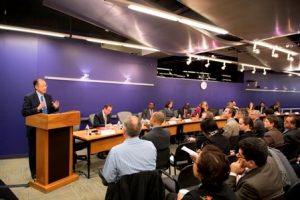 Le Comité directeur du GPSA s’est réuni pour la première fois le 17 décembre 2012 et a participé à une table ronde présidée par Jim Yong Kim, le Président de la Banque (voir photo). Cette table ronde, intitulée « Social Accountability and the Science of Delivery » (la responsabilité sociale et l’art d’être efficace), a rassemblé des représentants des États, des OSC et des bailleurs de fonds, ainsi que des membres du personnel de la Banque, qui ont débattu des moyens de renforcer l’efficacité de la fourniture des services afin de répondre aux besoins des citoyens. Les participants ont exposé les expériences de divers pays, qui montrent que lorsque les citoyens sont entendus et lorsque les gouvernements sont tenus de rendre des comptes, la prestation des services gagne en efficacité et devient plus durable. M. Kim a déclaré : « Avec le Partenariat global pour la responsabilité sociale, la Banque dispose désormais d’un instrument efficace pour compléter le travail des gouvernements et du secteur privé et pour trouver des solutions qui permettront de mettre un terme à la pauvreté et de favoriser une prospérité partagée. » Le même jour, le Comité directeur a également tenu sa première réunion de planification, lors de laquelle les participants ont discuté de la stratégie du GPSA pour sa première année d’existence, des procédures d’attribution des dons et d’un cadre pour la mesure des résultats.
Le Comité directeur du GPSA s’est réuni pour la première fois le 17 décembre 2012 et a participé à une table ronde présidée par Jim Yong Kim, le Président de la Banque (voir photo). Cette table ronde, intitulée « Social Accountability and the Science of Delivery » (la responsabilité sociale et l’art d’être efficace), a rassemblé des représentants des États, des OSC et des bailleurs de fonds, ainsi que des membres du personnel de la Banque, qui ont débattu des moyens de renforcer l’efficacité de la fourniture des services afin de répondre aux besoins des citoyens. Les participants ont exposé les expériences de divers pays, qui montrent que lorsque les citoyens sont entendus et lorsque les gouvernements sont tenus de rendre des comptes, la prestation des services gagne en efficacité et devient plus durable. M. Kim a déclaré : « Avec le Partenariat global pour la responsabilité sociale, la Banque dispose désormais d’un instrument efficace pour compléter le travail des gouvernements et du secteur privé et pour trouver des solutions qui permettront de mettre un terme à la pauvreté et de favoriser une prospérité partagée. » Le même jour, le Comité directeur a également tenu sa première réunion de planification, lors de laquelle les participants ont discuté de la stratégie du GPSA pour sa première année d’existence, des procédures d’attribution des dons et d’un cadre pour la mesure des résultats.
Le GPSA est unique à plus d’un titre. Premièrement, il accordera aux OSC des financements à long terme (sur 3 à 5 ans) ainsi que des fonds pour couvrir une partie de leurs frais institutionnels. Deuxièmement, le GPSA est le premier mécanisme de financement géré par la Banque dans lequel les OSC sont dûment représentées au sein de la structure de gouvernance. En effet, les représentants des OSC disposent non seulement du même nombre de sièges (trois sur un total de 10 membres) que les représentants des pays et des bailleurs de fonds (le Comité directeur est présidé par la Banque mondiale), mais également du même nombre de voix pour voter sur les projets qui recevront des financements et pour définir l’orientation générale du programme. Les trois représentants des OSC, qui ont été sélectionnés à l’issue d’une consultation de grande ampleur auprès des réseaux de la société civile internationaux et régionaux sont Said Issa (directeur des projets sur le terrain, Transparency International / Liban), Akwasi Aidoo(directeur exécutif, TrustAfrica / Sénégal) et Lindsay Coates (Vice-présidente, InterAction / États-Unis). Les autres membres du Comité directeur sont les représentants de trois pays (Malawi, République dominicaine et Bangladesh) et de trois bailleurs de fonds (Department for International Development /DfID, Finnish Aid et Fondation Ford). En outre, 15 OSC internationales ont adhéré au GPSA à titre d’organisations partenaires afin de collaborer aux activités de partage du savoir et d’établissement des réseaux (la liste peut être consultée sur le site Web du GPSA).
À ce jour, le GPSA a levé 23 millions de dollars (20 millions auprès de la Banque mondiale et 3 millions auprès de la Fondation Ford) et attend de nouvelles dotations de la part des donateurs. Le premier appel à propositions est diffusé largement dans les pays par différents moyens, dont la presse, les médias électroniques et le site Web du GPSA. Les OSC des pays adhérents pourront présenter leurs propositions sur une plateforme de soumission en ligne qui sera accessible depuis le site Web du GPSA. Les bureaux de pays de la Banque mondiale ont tenu des réunions de concertation avec les OSC et les représentants des pays afin d’adapter les appels à propositions aux priorités des pays, et ils organiseront également des sessions d’orientation pour les OSC souhaitant soumettre une proposition. Les financements s’échelonneront entre 500 000 et 1 million de dollars par don, et les dons seront accordés pour des périodes de 3 à 5 ans. Après la clôture des appels à propositions, le 14 mars, les demandes de dons seront examinées selon une procédure en deux phases, qui est décrite dans les directives pour la soumission d’une demande de don.
Liens utiles :
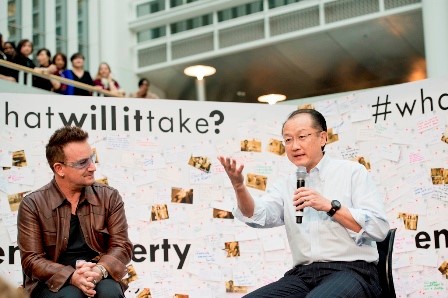
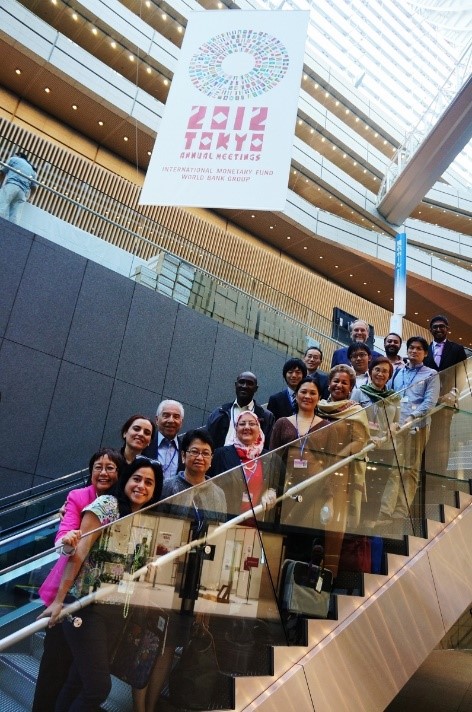


 Photo: Courtesy of iStockphoto
Photo: Courtesy of iStockphoto